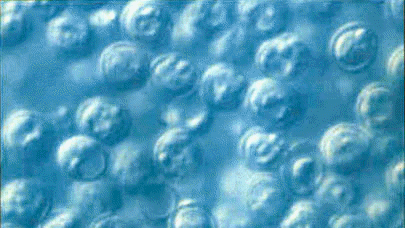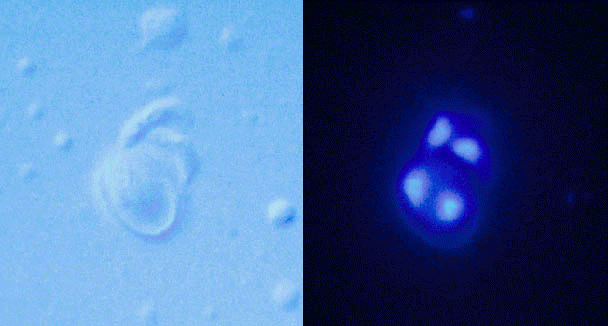Cryptosporidium spp. Information
Cryptosporidium spp.
are protozoan parasites that have been identified as a causative agents of human
cryptosporidiosis. This organism, in the final stage of its life cycle, produces
environmentally resistant structures known as oocysts that are 3-7um in size,
and these are capable of transmitting infection.  Oocysts are present in most
surface waters and are resistant to conventional chlorine disinfection;
therefore, maintenance of an efficient water plant filtration system is critical
for oocyst removal. Outbreaks of human cryptosporidiosis have been documented
since the mid-1980s including the now famous Milwaukee outbreak of 1993 that
infected circa 400,000 individuals. Abdominal
pain, nausea, fever, and fatigue often accompany infection by Cryptosporidium;
however, not every infected individual will manifest symptoms. Cryptosporidiosis
may become life-threatening for immuno-compromised or immuno-suppressed
individuals.
Oocysts are present in most
surface waters and are resistant to conventional chlorine disinfection;
therefore, maintenance of an efficient water plant filtration system is critical
for oocyst removal. Outbreaks of human cryptosporidiosis have been documented
since the mid-1980s including the now famous Milwaukee outbreak of 1993 that
infected circa 400,000 individuals. Abdominal
pain, nausea, fever, and fatigue often accompany infection by Cryptosporidium;
however, not every infected individual will manifest symptoms. Cryptosporidiosis
may become life-threatening for immuno-compromised or immuno-suppressed
individuals.
Detection of oocysts in water samples is accomplished by reacting
immunofluorescent antibodies with specific biochemical markers on the surface of
the oocysts. Oocysts successfully labeled with these fluorescent tags can then
be visualized using IFA microscopy. After detecting a putative oocyst with
immunofluorescent antibodies, DAPI (a nuclear stain) and DIC microscopy features
aid in the confirmation/invalidation process.
Depicted in the photo are two sporozoites excysting from the oocyst.
References:
AWWARF (American Water Works Association, Research Foundation). Cryptosporidium:
Answers to Questions Commonly Asked by Drinking Water Professionals.
1997. Frey M., C. Hancock, G. S. Logsdon. Denver.
Fayer R.,ed, Cryptosporidium and Cryptosporidiosis. 1997.CRC
Press LLC. Boca Raton, FL.
AWWA (American Water Works Association). Waterborne Pathogens. Manual
of Water Supply Practices, M48, First Edition. 1999. Denver.
For More Information Contact:
CH Diagnostic & Consulting Service, Inc.
512 5th Street, Berthoud, Colorado 80513
Tel: 970-532-2078
FAX: 970-532-3358
Internet: ssheldon@chdiagnostic.com